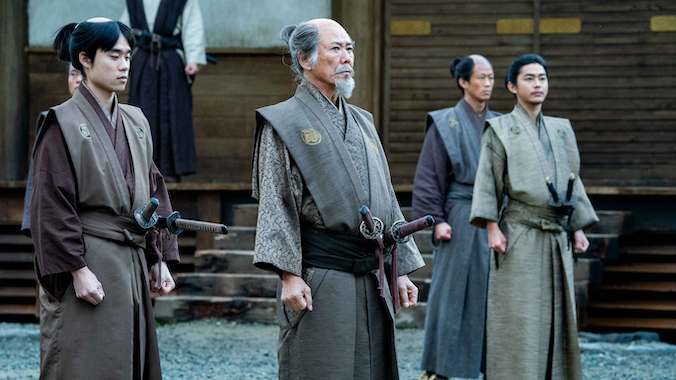FX’s Shōgun Is an Epic, Ambitious Reminder of Everything That’s Great About TV
Photo Courtesy of FX
As the television landscape seemingly contracts all around us and our pop culture seems interested in little beyond endless procedurals and remakes of preexisting IP, FX’s Shōgun often feels like something from another time. A lavish, ambitious adaptation of James Clavell’s popular novel of the same name, it’s a series that takes big swings, demands much of its audience, and insists that complex character dynamics are every bit as compelling as sweeping, bloody battles. Though it has its flaws, the show is both a genuine spectacle and genuinely spectacular, and if there’s any justice, it should be one of the biggest hits of the year.
Set during a time of political upheaval when Japan’s powerful Taiko has died and left behind a child who isn’t yet old enough to rule, Shōgun follows the story of five warring clans who seek to control the country. Though a Council of Regents has been established to ostensibly hold power until the heir comes of age, competing factions—led by aging war hero Lord Yoshii Toranaga (the great Hiroyuki Sanada), former right hand to the Taiko, and the scheming Lord Ishido (Takehiro Hira), who has plans of his own—are already on the brink of shattering the tenuous peace. Threatened with impeachment, removal from his position, and almost certain death, Toranaga must scramble to both stay alive and hold Japan together.
He gets an unexpected bit of help from the arrival of a mysterious ship carrying a mere dozen surviving British Protestants. Once part of a Dutch fleet, its crew has been winnowed down by starvation and disease, but Toranaga sees an opportunity in both the ship and its leader, the pilot named John Blackthorne (Cosmo Jarvis). Blackthorne, eager to tell the Japanese of the perfidy of their established Catholic trading partners and introduce their trade routes to the wider world, becomes at first an unwilling and then an invaluable element of Toranaga’s plans as their fates become increasingly intertwined.
With the help of Toda Mariko (Anna Sawai), a Catholic convert who learned to speak Portuguese from the priests who taught her religion and who serves as a translator for Blackthorne, Toranaga learns not only of the muskets and cannon available aboard the stranger’s ship but many of the secrets the Portuguese have been keeping, of a sort that goes well beyond economic interests and which have the potential to damage the power of their proxies on the ruling council. What follows is a sweeping story of ambition and war, betrayal and ever-shifting alliances. As the council attempts to find a way to rid themselves of Toranaga and the former war leader works to keep himself, his clan, and the vision of the realm he believed in alive, there are plenty of bloody twists, painful sacrifices, and complicated mind games along the way.
Blackthorne, renamed Anjin (Japanese for “pilot”), struggles to understand the alien culture he has suddenly found himself in, with its dedication to honor and propensity for ritual violence. (His insistence that surely he’ll be understood if only he shouts louder is so quintessentially British it hurts.) But Shōgun smartly eschews any hint of a white savior narrative, embracing and elevating Japanese culture and erasing much of the “othering” that is so prevalent in the original miniseries. Here, characters predominantly speak Japanese, with subtitles, drawing the audience into every conversation, providing backstories, and allowing us to see the lives and relationships of its characters play out for ourselves. One of the best things about Shōgun is how interested it is in the act of translation and the power language holds: the audience is not only allowed to hear conversations happening in front of Blackthorne that he does not understand but shown the truth of the language that is changed or avoided in the process of passing it on to him. (Even Blackthorne and Mariko’s conversations take place in Portuguese, though we as the audience hear them as English. It’s not as confusing as it sounds, I promise.)